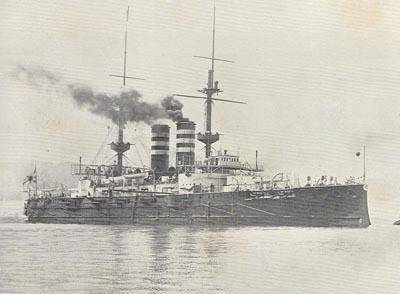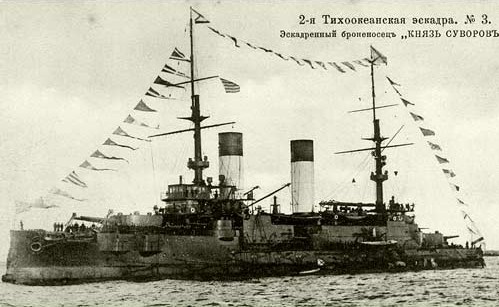padisha emperor
Senior Member
The Battle of Tsushima
List of the vessels of the Tsushima battle

Japanese Fleet

The japanese battleship Mikasa, flagship of the amiral Togo, leader of the japanese naval forces at Tsushima.

The russian battleship Borodino.

The russian battleship Souvorov, flagship of the Amiral Rojdestvenski, destroyed during the battle.

Japanese Amiral Togo

May 27-28, 1905
This culminating battle of the Russo-Japanese War was fought in the Korean Straits between the Russian Baltic Fleet under Admiral Zinovi Rozhdestvensky, who was attempting to link up with the Vladivostok Squadron and thus shore up Russia's sagging strategic position, and a Japanese fleet under Admiral Togo Heihachiro, who sought to annihilate Russian naval power in East Asia. Approaching the battle, the Japanese held a number of distinct advantages over their Russian enemy: operation from nearby bases, a compact force of modern battleships of uniform speed and firepower, thorough training and high morale of officers and men, and careful planning and intense training for critical strategic and tactical objectives.
Intercepting the cumbersome Russian force as it steamed northeastward on May 27, Togo undertook a daring maneuver that headed off Rozhdestvensky and brought his lead ships under devastating Japanese fire. In the next twelve hours of fighting between the battle lines, Japanese gunfire and torpedoes shattered the Russian fleet. By noon the next day, Rozhdestvensky surrendered; most of his ships had been sunk or captured, including all eight battleships. Togo lost only three torpedo boats.
Tsushima was one of the most annihilating victories in the history of naval warfare, and, as such, it became the model for Japanese naval doctrine. Following the battle, Russia dropped from third to sixth place among the world's sea powers, while Japan leapt to third place. Tsushima demonstrated the great increase in weapon range and appeared to confirm the principle of the all-big-gun battleship.
List of the vessels of the Tsushima battle

Japanese Fleet

The japanese battleship Mikasa, flagship of the amiral Togo, leader of the japanese naval forces at Tsushima.

The russian battleship Borodino.

The russian battleship Souvorov, flagship of the Amiral Rojdestvenski, destroyed during the battle.
Japanese Amiral Togo



